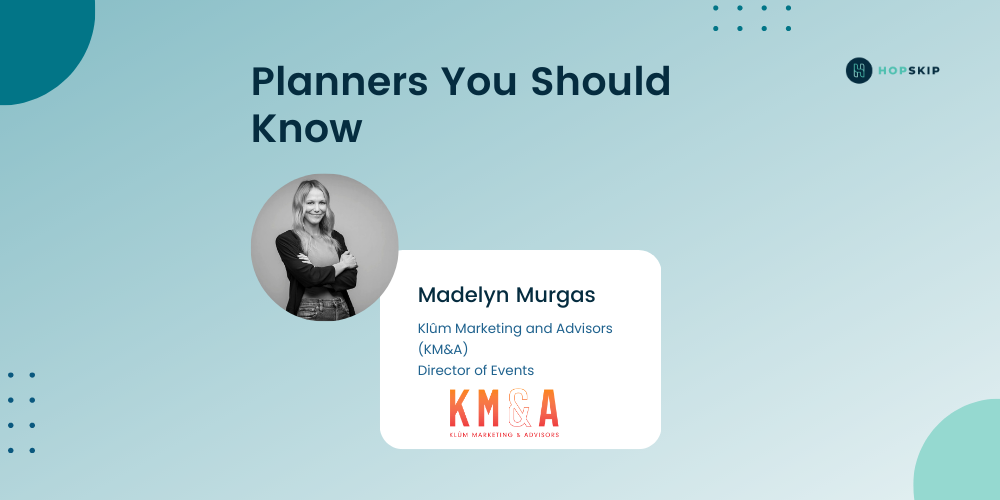Planners You Should Know - Madelyn Murgas, Klum Marketing & Advisors
Madelyn Murgas, of Klum Marketing & Advisors, discusses how she honed her skills over the pandemic to now be in position to overcome the challenges that the new meetings/events landscape brings.
Luke Whalin
Feb 10, 2023

This post is part of the HopSkip Planner Spotlight Series where HopSkip spotlights planners across the industry to bring awareness of how they adapted to COVID-19, communicating and lessons learned and sharing how they are viewing the meetings and events industry in a post-pandemic world.
Name: Madelyn Murgas
Company Name: Klum Marketing & Advisors
Job Title: Director of Events
Years of Experience: 11
How did you get your start in the events industry? What made you pursue this role?
I started in hotel operations with Hyatt. I graduated from LSU and found an entry-level operations role as part of the reopening team for Hyatt Regency New Orleans.
How do you compare planning your first in-person event post-pandemic, to planning meetings/events pre- Covid? What was different and unique? What was similar?
What was your number one challenge in hosting your first in-person event(s) and how did you overcome it?
I think there was a little more pressure to be engaging and fresh post-pandemic. People hadn't been to live events in so long, and everyone was excited to be face-to-face again. People also had safety concerns that had never been an issue before, I so think learning all of those processes as we went was a bit of a challenge. I realized, without a doubt, that live events cannot be replaced. They can be supplemented and enhanced with virtual and hybrid components, but the experience of being with peers outside of your office or home office is invaluable.
Since we work with different clients in different industries, I think it was finding the proper guidance to give on when to make the shift away from virtual back to in-person. There are so many factors to consider, and what was right for one type of event, wasn't necessarily the right path for other events. I think open and honest conversations with our clients helped us build plans to put them back on track to return to in-person, but also to guide them on how to use virtual and hybrid tools long-term.
What is the top learning that you uncovered from the last two years that you’re implementing in your planning process today? (any other tips or tricks you want to share?)
I would say it's educating your stakeholders. Between the pandemic, cities affected by civil unrest, inflation (and pretty much anything else you can think of), there have been many challenges to overcome in the last two years. As a planner, it's our job to know how to advise clients on how to make decisions that won't have a damaging impact long-term, based on something that's happening today. We've researched and put together decks to show our clients the WHY behind price increases, hotel/venue change recommendations, and contractual terms.
It's no longer typical for a hotel to respond to an RFP within 72 hours. Make sure you give your clients realistic timelines on how long it may take to get bids back. I advise them to be flexible on dates and locations when possible, so they aren't forced into a hotel they may not like or a higher price point.
Yes. Here are the top things I'm looking for: 1. Protection on room rates with the lowest rate clauses-Favorable and detailed force majeure or impossibility clauses-tiered cancellation -Rebook options. 2. Working with brands and hotels that are fair and open to offering unique solutions as unforeseen circumstances arise.
1. Make sure you are addressing all terms/questions in the RFP, like alternate dates, and concession requests, and sending with actual meeting space so we can look at capacity charts and floorplans to see if the venue will be a good fit. 2. Let us know that you are working on it if you aren't sure if you'll get it in by the deadline. 3. Always send the contract in word with tracked changes turned on. This is the easiest way to get edits done quickly. 4. Be reasonable on signing dates. Turning a contract around in less than seven days for a future event is unlikely.
Due to the pandemic, our events community had to evolve, adapt, and grow. Many planners started to embrace new technologies as a result of the pandemic. What new tech are you using today in your planning process as a result?
This post is part of the HopSkip Planner Spotlight Series where HopSkip spotlights planners across the industry to bring awareness of how they adapted to COVID-19, communicating and lessons learned and sharing how they are viewing the meetings and events industry in a post-pandemic w,orld.
Anything that gets me out of my inbox! For me, that's a combination of project management software (we use Wrike), Teams, and Sharepoint. Setting communication expectations internally and externally helps me be more productive and manage my time better.
Since education and relationships are two major pillars in the meetings and events industry, any suggestions on how other planners can learn and network with their peers across the industry?
When you are strategizing for the next year at the end of the current year, make sure that your own professional goals are part of that plan. Take a look at the next 12 months and commit to either a certain number of events/conferences you want to attend or identify exactly which ones you think will be most beneficial. Once the year kicks off, our calendars fill up, and this can easily be put on the back burner.